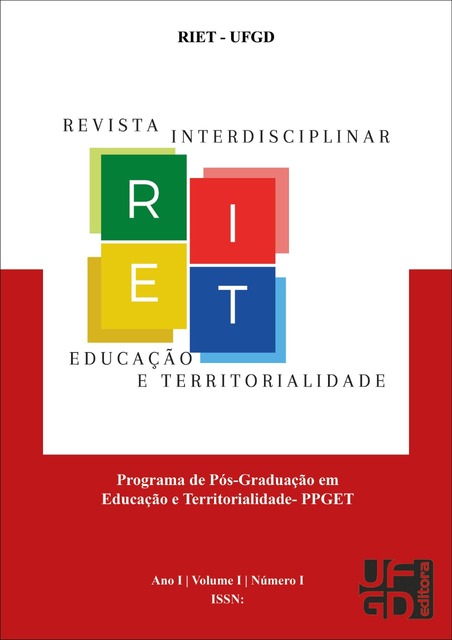Cyberculture and the use of Information and Communication Technologies (ICT) by indigenous leadership as tools for the recognition of cultural identity: other territories and spaces of resistance
DOI:
https://doi.org/10.30612/riet.v1i1.12958Keywords:
Indigenous peoples. Identity. Cyberculture.Abstract
This paper aims to discuss the use of ICT, especially social media, by indigenous leaders as tools for the recognition of cultural identity. In intercultural processes, ICT reveal themselves as important tools, which aim to strengthen educational, political, social and cultural relations within the scope of indigenous communities, with the potential to go beyond this context, although many still do not have access in the current Brazilian society, mainly ethnic minorities, as many villages are located in distant cities and generally without access to the Internet. From the study, reading and fi eldwork on the relation of the theme proposed here, which involves ICT, interculturality and the identity of indigenous peoples, the following questions arose: how ICT is used by indigenous leaders in order to recognize the culture of peoples originating? What tools or platforms do they use for this recognition of their ethnic identity? What is the role of ICT in the work developed by these indigenous people? For the development of the investigation, we concentrated the theoretical basis, mainly in the readings of the following thinkers: Hall (2005), Freire (1979/1983), Fleuri (2005), Levy (1999) and Castells (1999). The methodology adopted was ethnographic research, bibliographic and documentary research, with a qualitative approach. An interview was also conducted with a young indigenous student, leader of the Pitaguary community. The results and conclusions lead us to refl ect on interculturality with positive data, since the indigenous people appropriate and use ICT knowledge to recognize their own culture, their origins, their history and native heritage.Downloads
References
AIRES, Max Maranhão Piorky et all (2009). Escolas Indígenas e Políticas Interculturais no Nordeste Brasileiro. Fortaleza: EdUECE.
BRASIL. Constituição da República Federativa do Brasil, 1988.
BRASIL. Convenção no 169 da Organização Internacional do Trabalho - OIT sobre Povos Indígenas e Tribais, 2004.
BOGDAN, Roberto C.; BIKLEN, Sari Knopp. Investigação qualitativa em educação. Tradução Maria João Alvarez, Sara Bahia dos Santos e Telmo Mourinho Baptista. Porto: Porto Editora, 1994.
CARMO, Hermano. Ferreira, Manuela, M. Lisboa: Universidade Aberta, 2008.
CASTELLS, Manuel. Cibercultura. São Paulo: Ed. 34, 1999.
CASTELLS, Manuel. A sociedade em rede. São Paulo: Paz e Terra, 2005.
FLEURI, Reinaldo Matias (2005). Palestra Proferida no V Colóquio Internacional Paulo Freire-2005. www.paulofreire.org.br/Textos/ fleuri_2005_recife_resumo_e_texto_completo.pdf
FOUCAULT, Michel. Vigiar e punir: História da violência nas prisões. São Paulo: Ática, 2002.
FOUCAULT, Michel. O sujeito e o poder. In: DREYFUS, H. & RABINOW, P.: Michel Foucault – uma trajetória filosófica. RJ: Forense Universitária, 1995.
FREHSE, Fraya. Ô da rua. O transeunte e o advento da modernidade em São Paulo. São Paulo: Edusp, 2011.
FREIRE, Paulo. Educação como prática da liberdade. 17.ed. Rio de Janeiro, Paz e Terra, 1979.
FREIRE, Paulo. Pedagogia do Oprimido. Rio de Janeiro, Paz e Terra, 1983.
HALL, Stuart. A identidade Cultural da pós-modernidade. DP&A Editora, 2005.
MAGNANI, José Guilherme Cantor. A etnografia como prática e experiência. Horizontes antropológicos. Vol.15, N.32, Porto Alegre, jul./dez. 2009.
MUNDURUKU, Daniel. O caráter educativo do movimento indígena brasileiro. São Paulo: Paulinas, 2012.
Downloads
Published
How to Cite
Issue
Section
License
Os autores devem aceitar as normas de publicação ao submeterem a revista.
Os artigos publicados passam a ser propriedade da revista.
Autores que publicam neste periódico concordam com os seguintes termos:
(a) O Conselho Editorial se reserva ao direito de efetuar, nos originais, alterações da Língua portuguesa para se manter o padrão culto da língua, respeitando, porém, o estilo dos autores.
(b) Autores mantém os direitos autorais e concedem à revista o direito de primeira publicação, com o trabalho simultaneamente licenciado sob a Licença Creative Commons Attribution que permite o compartilhamento do trabalho com reconhecimento da autoria e publicação inicial nesta revista.
(c) Autores têm autorização para assumir contratos adicionais separadamente, para distribuição não-exclusiva da versão do trabalho publicada nesta revista, exemplo: publicar em repositório institucional ou como capítulo de livro, com reconhecimento de autoria e publicação inicial nesta revista.
(d) Autores têm permissão e são estimulados a publicar e distribuir seu trabalho online – em repositórios institucionais, página pessoal, rede social ou demais sites de divulgação científica.

